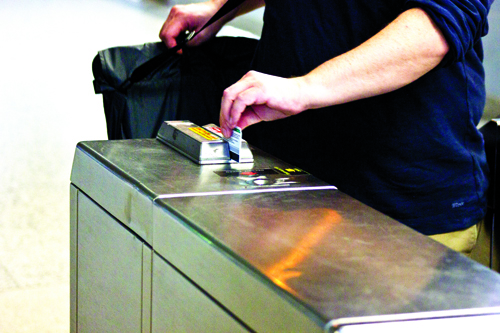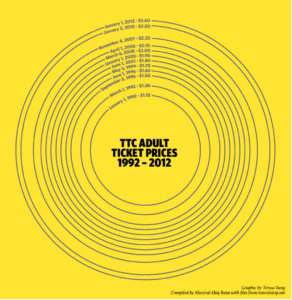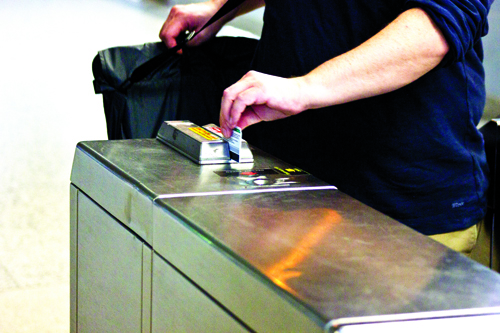Final decision to be made in November after budget is approved
Melissa Sundardas
News Editor

The Toronto Transit Commission’s board approved a five-cent fare hike in principle last Thursday in an attempt to fill a $28 million shortfall in its 2013 operating budget.
The proposed hike to commence January 1 would generate another $18 million a year for the TTC, still falling $10 million short, says Brad Ross, executive director of corporate communications for the TTC.
“We’ve been told that our subsidy level will remain unchanged for 2013, so we have to go by that assumption, and we need to find that $10 million,” says Ross.
The five-cent hike will cause the cost of tokens to rise from $2.60 to $2.65, post-secondary student Metropasses from $104 to $106, and adult Metropasses from $126 to $128.50. The price of cash fare will remain unchanged.
Ross explains the TTC board, and not the city council, has the authority to approve the TTC’s budget. The city council, on the other hand, approves the operating subsidy the TTC receives from the City of Toronto, which is approximately $500 million.
The TTC board, made up of city councilors, has the authority to make decisions on things like fare increases, service levels, and organizational downsizing.
The commission did not want to wait until November, when the final vote on the budget is expected to take place, to notify the public of the potential changes, so that surprises could be avoided, Ross says.
The 5-cent fare increase is “well within the rate of inflation,” Ross says, adding that it will prevent the TTC from having to cut services.
The TTC anticipates a “record ridership in 2013,” according to Ross, who says, “In order to meet that demand, we need to put ridership on the street—that is, more buses to allow us to meet that ridership demand.”
 During the same commission meeting, it was also decided that bus cleaning would be contracted out, starting with two of eight garages, which will save the TTC one million dollars. If, ultimately, all garages are contracted out for bus cleaning, there will be savings of about $4.2 million, Ross says.
During the same commission meeting, it was also decided that bus cleaning would be contracted out, starting with two of eight garages, which will save the TTC one million dollars. If, ultimately, all garages are contracted out for bus cleaning, there will be savings of about $4.2 million, Ross says.
Repeated attempts by Excalibur to reach Bob Kinnear, transit workers’ union president, for comment regarding the commission’s vote to outsource cleaning work were unsuccessful.
There are a number of other things the TTC can consider to make up for the deficit in 2013 without cutting services, Ross says, including reductions and savings in overtime, tackling absenteeism in employees, and lowering the cost of accident claims.
Some other cost-cutting initiatives include the outsourcing of garbage collection from the subway stations and their public washrooms, which will begin shortly.
With files from Munirul-Haq Raza




